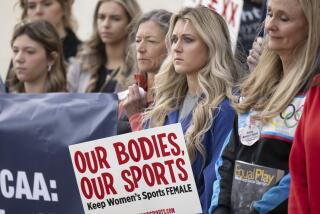Sprinters’ Testimony Is Sought by USADA
- Share via
Months before she publicly admitted having used steroids, and accepted a two-year ban from competition, sprinter Kelli White revealed the same information behind closed doors to federal prosecutors and a grand jury in San Francisco, her lawyer said Wednesday.
Now, officials from the U.S. Anti-Doping Agency are trying to find out what four other track stars -- those they are seeking to keep off the U.S. Olympic team -- may have told the same panel, according to sources familiar with the investigation.
USADA has asked sprinters Tim Montgomery, Chryste Gaines, Michelle Collins and Alvin Harrison to release copies of their testimony, according to the sources, who spoke on the condition of anonymity. Prosecutors are barred from releasing the sealed testimony.
The four were notified by the agency Tuesday of “potential” doping violations.
The testimony conceivably could bolster USADA’s effort to suspend athletes it suspects of using banned substances, but it is far from clear that any of the four would provide the transcripts.
Attorneys for Montgomery, Gaines and Collins have said they intended to fight any attempt at banning their clients from the Olympics. Harrison’s attorney could not be reached.
The sprinters have come under scrutiny because of the BALCO federal case, where four men have been indicted for distributing steroids to dozens of professional baseball and football players and Olympic athletes. Many of the athletes with alleged connections to the Bay Area Laboratory Co-Operative were called before the grand jury last fall.
Some evidence from that case -- including unofficial test results, canceled checks and e-mail -- was turned over to USADA for its investigation.
USADA has given Montgomery, Gaines, Collins and Harrison until June 18 to respond to the potential violations.
After that, a review board will consider the evidence against each. If the board recommends moving forward, each athlete will be notified of a formal charge.
Normally, that starts a procedure of hearings and appeals that can stretch for months.
But with the Olympic trials beginning July 9, and U.S. officials intent on sending a clean team to Athens, USADA has requested an expedited procedure, Collins’ lawyer said.
Attorney Brian Getz said he expected an arbitration to be scheduled well before the trials. “I’m ready to go tomorrow and my client was ready yesterday,” he said.
But he said the scientific nature of some of the evidence could require preparation.
“For example, they’re alleging certain blood analysis formats,” he said. “Hypothetically, if the blood shows a low percentage of water and they’re claiming dehydration associated with ingestion of testosterone, it’s pretty obvious there could be a number of explanations.
“I would have to bring in some witnesses to talk about what other possibilities exist.”
Despite such complexities, a speedy process would not be unprecedented.
In a 2002 doping case, bobsledder Pavle Jovanovic was notified of a positive test result in mid-January and had an arbitration ruling in hand by the end of the month.
His appeal was heard and a final ruling delivered -- Jovanovic was suspended for two years -- by early February.
The time frame for the current investigation could also be accelerated if USADA gains access to grand jury testimony in which an athlete has implicated him or herself.
The agency has sought the cooperation of BALCO owner Victor Conte, though a deal has yet to be struck.
Targeted athletes might also decide to follow the lead of White, who reviewed the evidence and accepted a decreased suspension.
Her attorney, Jerrold D. Colton, said: “My client has always been truthful, whether before the grand jury or USADA.”
More to Read
Go beyond the scoreboard
Get the latest on L.A.'s teams in the daily Sports Report newsletter.
You may occasionally receive promotional content from the Los Angeles Times.







